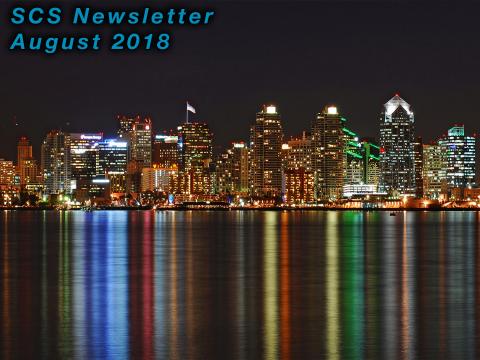Dear SCS Members:
I am very excited that this January is the Sesquicentennial Meeting of our professional association! It is a time to reflect on where we have been, where we are now, and where Classics will be in the 21st century. The SCS Program Committee and the Sesquicentennial Committee have been hard at work on what we think will be a uniquely memorable gathering.
Firstly, we are delighted to have two public lectures. Invited as key note speaker is Prof. Mary Beard of Cambridge University. Prof. Beard has been an important voice in bringing Classics to the public sphere in a wide variety of formats. Her publications are too many to list, but in San Diego she will consider the role of Classics in the context of global history. Her public talk will take place on Saturday, January 5th at 6:00 pm. A reception will follow at 7:15 pm.
We are equally enthusiastic about our second public lecture which is organized through the SCS Outreach Committee in conjunction with the Onassis Foundation. Luis Alfaro, a Chicano performance artist, writer, theater director and social activist is well known in the world of classics for his contemporary retelling of ancient tragedy, the Oedipus Rex and more recently, the Medea. He will discuss his views about this process in a public lecture scheduled for Thursday, January 3rd at 8:15 pm.
To broaden our view, the Sesquicentennial Committee has organized several novel panels and workshops for presentation at the annual meeting.
- Prof. Stephen Hinds will lead a workshop entitled “The Future of Classics.” A free-form workshop/discussion in which all members can discuss what the trajectories of Classics will and should be, and not just in the immediate future but for the next 150 years.
- Prof. Matthew McGowan has organized the panel “From APA to SCS: 150 Years of Professional Classics in North America.” Within the context of this panel, Professor Ward Briggs will present his history of the SCS within the last fifty years, an important update to the history of the Society.
- There is the “Rome and the Americas, New Soundings in Classics, Art and Archaeology” panel which is important in demonstrating the influence of Rome in the New World, particularly within Latin America as well as the US.
- Prof. Richard Talbert’s panel “Mapping the Classical World Since 1869: Past and Future Directions” will highlight new developments in the Study of Ancient Maps; a fitting look at how far our understanding of the geography of the ancient world has come in the last 150 years.
To continue with our theme of Classics in a global context, our president, Joe Farrell, has organized at our Sesquicentennial Meeting an extraordinary Presidential Panel that will focus on this topic with a group of scholars from around the world. Given the interconnectivity of modern academic worlds, this is an important topic for understanding the ways in which Classics can thrive in the coming century.
Additionally, with the future in mind I am particularly pleased to announce the introduction of Lightning Talks, a new format for papers. There will be two sessions of Lightning Talks, made up of six minute presentations with ample time (fourteen minutes) to discuss the ideas presented. It seems appropriate to unveil this new format for our 150th anniversary meeting.
Finally, I want to call your attention to the Roundtable that the SCS Program Committee has organized. Titled “How to Write and Respond to Journal Reviews: A Discussion of Best Practices with Classics Journal,” this roundtable is intended to give hands-on advice to reviewer and reviewees on a topic that is critical to the success of scholars, old and young alike.
Given so many stimulating new elements scheduled for San Diego, in addition to a program that is extremely full, it should not be surprising that we have to begin the meeting with sessions on Thursday, January 3rd in the afternoon – the first time in my four years as Vice President for Programs. There is good reason for as many members to attend as possible. San Diego will certainly be a welcoming city, with no snow storms on site. That much I can promise.
The SCS Program Committee, along with the members of the Sesquicentennial Planning Committee, and I look forward to seeing you in San Diego in January.
Valete,
More August 2018 Newsletter Content
Discover outreach initiatives underway throughout the SCS.
Learn about how to apply for travel stipends to the annual meeting.
Photo Credits for July, 2018 Newsletter

